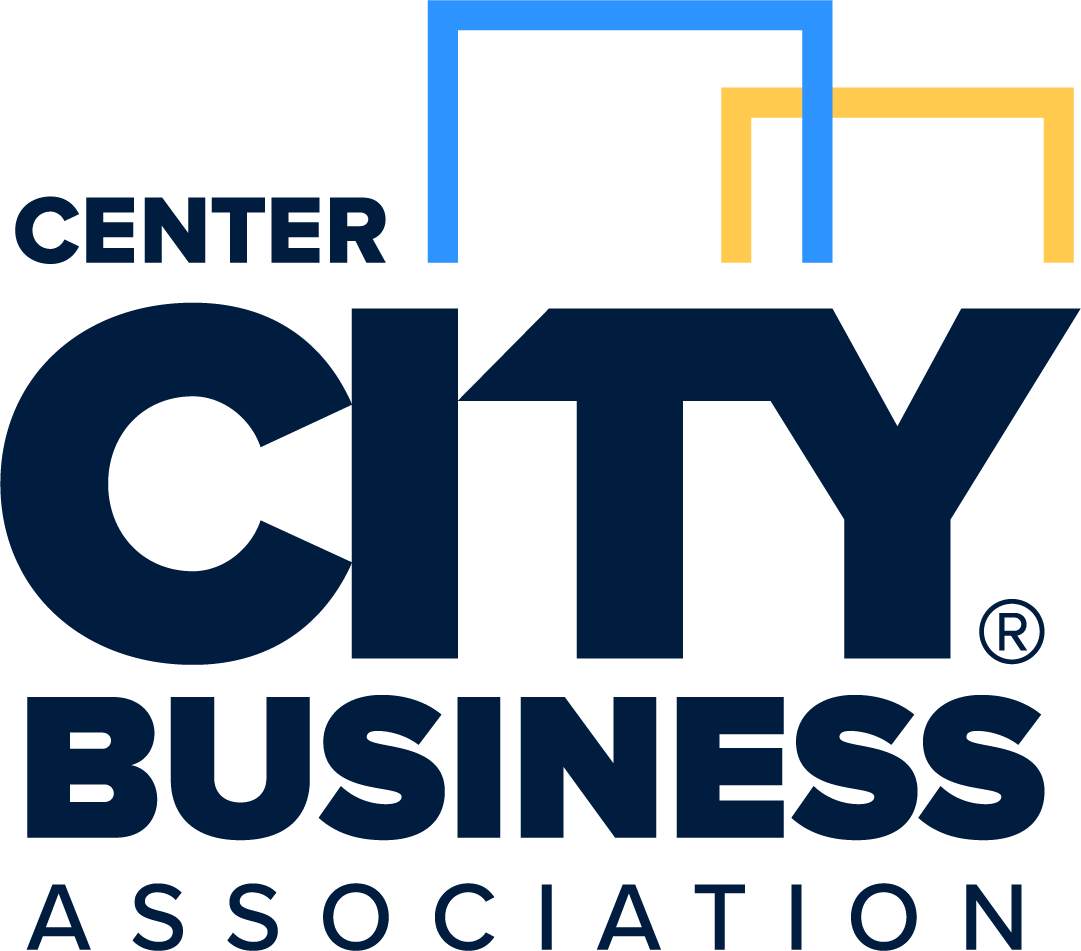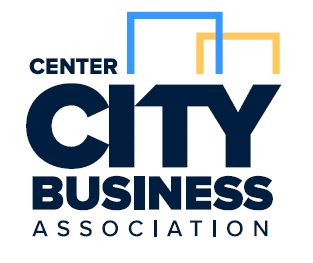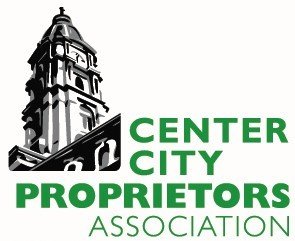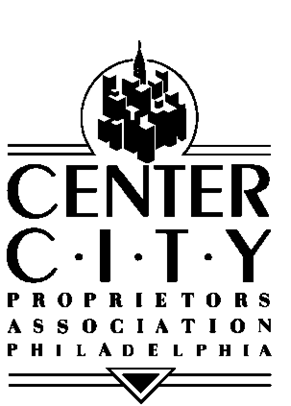Center City Business Association is a non-profit, Philadelphia based, member supported, chamber of commerce. Founded in 1978 as Center City Proprietors Association, Inc., the Association remains dedicated to serving Philadelphia’s businesses by providing connections, insight, resources and community through a variety of programs and events.
About Center City Business Association
We are the premier business association that creates a prosperous Philadelphia by making it easy to connect, grow, and sustain success.
Our Mission is to foster communication, cooperation, education, and services among the businesses of Center City Philadelphia and to maintain and promote the commercial vitality of Center City Philadelphia.
What we value most:
Center City Centric - By elevating Center City, we make a lasting effect on all of Philadelphia.
Provide opportunity - Philadelphians are gritty. When we have access to the savviest business minds and the resources to succeed, nothing stands in our way.
Educate our community - Knowledge is power. We promote the growth and development of Philadelphia businesses.
Embrace differences - We grow from each other’s experiences. Uplifting the voices of others creates a vibrant environment ripe for collaboration and advancement.
Meet the people behind Center City Business Association
Board of Directors
Staff
Center City Business Association
Milestones 1978-2022
Center City Proprietors Association DBA Center City Business Association
1978 A group of six city leaders brainstorms and decides to create Center City Proprietors Association as a nonprofit, member-supported organization. The first planning sessions take place in March, and the first official public meeting is held on May 15. The founders include: Steve Poses (owner of Frog and Commissary restaurants, now of Frog Commissary), Helen London (owner of Le Cook Nook, now of Previn Incorporated), Tom Harris (of Albert M. Greenfield Realty, now of Thomas R. Harris Real Estate), Betsy Cohen (founder of Jefferson Bank, now CEO of The Bancorp Bank), attorney Roy Yaffe (then Partner with Yaffe & Golden and now Partner with Gould Yaffe & Golden), and Meryl Levitz (then with Educational Resources for Business, and later President and CEO of Visit Philadelphia (formerly Greater Philadelphia Tourism Marketing Corporation).
The organization was named Cooperative Association of Proprietors (fondly remembered as CAP)
1979 The organization hires Meryl Levitz as its first executive director, produces the first “Meet the Mayoral Candidates Night,” and helps organize the first Graduate Hospital Fair.
Later this year, the Commonwealth of PA forced CAP to change its name to exclude the term cooperative which was restricted to the agricultural sector. CAP became the Center City Association of Proprietors
1980 CCAP helps raise funds for the Annual Flower Show in Rittenhouse Park, starts exploring ways to promote its restaurant and catering members, and creates the first Holiday Coalition to develop a more organized approach to seasonal celebrations.
1981 CCAP organizes the first Easter Promenade, Egg Hunt and Fashion Show in Rittenhouse Park, a Christmas Carol-In, and continues support of the Rittenhouse Flower Market. Later many micro-marketing offshoot groups, such as Rittenhouse Row and South Street Head House District produce these programs.
1982 CCAP receives tribute from Mayor Green “for its efforts to promote Center City and for helping to return the Christmas season and spirit to Center City Philadelphia this year.” CCPA’s holiday marketing efforts become the first “Philadelphia Loves Christmas” campaign, with the city’s first organized window-decorating contest. These events and holiday programs catalyzed into numerous neighborhood- specific celebrations that take place all year long.
CCAP produces the first Center City consumer-friendly maps that continue to be issued for seven years. Today, for-profit companies like Playground Maps and destination publications such as Where produce these maps.
1983 CCAP produces the first Philadelphia Restaurant Gala. This led to the creation of The Book and The Cook, an internationally renowned festival, to which CCPA donated office space and sponsored through 2009.
1984 CCAP introduces the first co-op advertisement programs for independent merchants; these are now handled by the many micro-marketing groups throughout the region. CCPA sponsors a popular series of brunches with the Foundation for Architecture. CCPA receives two tributes from Mayor Goode, in “recognition of its successful efforts to promote Center City, and in warm appreciation of the spirit of cooperation, which exists among its members,” and “in recognition of the culinary excellence and spirit of cooperation in the Philadelphia Restaurant Gala.”
1985 CCAP organizes a fundraiser for the start up of the American Music Theater Festival, now the Prince Theater, and initiates the “Trash Forum.”
1986 CCAP was the first proponent of businesses being open late on Wednesday nights, which developed into the successful program “Make It a Night.”
CCAP changed its name again to Center City Proprietors Association or CCPA
1987 CCPA hosts the first Annual Center City Philadelphia Business Awards.
The association also supports the lighting of the Ben Franklin Bridge by raising money for the new light bulbs. CCPA produces the enormously successful Governor’s Ball – part of the “We the People 200” national celebration of the 200th Anniversary of the U.S. Constitution.1988 CCPA starts championing the creation of the Center City District (CCD), which is founded in 1991, continues the holiday window-decorating contest and is recognized for its “outstanding contribution to the 1988 Governor’s Conference on Small Business.”
1989 CCPA implements the first “Big Sweep/Clean Sweep” program, another step towards the formation of CCD. This innovative program evolved from solving a negative trash problem into implementation of numerous physical streetscape improvements. CCPA receives a citation from Mayor Goode for “leadership on issues of importance to the betterment of the Philadelphia business community.”
1990 CCPA creates the “I Do Care” foundation, the business community’s response to panhandling and hunger, and the first anti-panhandling campaign, “The More You Give Change, The More Things Stay the Same.” Today, this is still an issue being addressed by CCPA public forums, in partnership with CCD and various city offices. In cooperation with Mayor Goode, CCPA also introduces the “Vendor Food Coupon” program to address panhandling and hunger – 25,000 coupons sold – and was a prototype for the CCD program.
1991 CCPA lobbying efforts are successful; Center City District is founded.
1992 CCPA launches the holiday radio campaign, “More to Do, More to See, More Than Ever…Center City Philadelphia.”
1993 CCPA receives tribute from Mayor Rendell for “helping to provide a better quality of life for all Philadelphians.” The association participates in the Hospitality Coalition for Tax Fairness – a campaign against the “liquor by the drink” tax.
1994 CCPA, in conjunction with the Greater Philadelphia Restaurant and Purveyor Association, creates “Celebrate the City” awards, recognizing individuals who have demonstrated growth in their business and made outstanding contributions to the vitality of Center City. CCPA supports the “Art Front Partnership” by raising funds for dressing empty storefronts. CCPA also conceives, develops and coordinates “The Book and The Cook 10th Anniversary Reunion Gala Courvoisier Toque Awards.” CCPA creates “Visions of Sugar Plums,” a competition in which local chefs construct unique gingerbread houses that are auctioned off for the benefit of “Project H.O.M.E.,” a homeless advocacy group.
1995 CCPA implements the “Sweet Dreams” competition benefiting the Academy of Vocal Arts. CCPA offers “Singles Networking,” a series of seminars for single, sole proprietors.
1996 CCD awards CCPA $25,000 grant to produce “Center City Celebrates Style,” in conjunction with Phashion Phest Philadelphia – later known as “Center City Celebrates Style.” This successful fashion event and supporting grants continued for three years. CCPA supports “Project H.O.M.E.” with a 1515 Fairmont Ribbon Cutting. CCPA supports the “In-Line Town Watch,” a Center City town watch that uses In-line skaters to act as the eyes and ears of the police department, by helping raise $6,000.
1997 CCPA continues “Center City Celebrates Style,” radio campaigns and promotional events.
1998 CCPA implements a major fundraising event benefiting the Aids Information Network – now known as Philadelphia Fight. CCPA begins planning the Freire Charter School, a secondary school with a business and entrepreneurial focus. CCPA advocates reopening Chestnut Street to traffic.
1999 CCPA signs the charter creating the Freire Charter School. CCPA receives a tribute from Mayor Rendell for “contributions to the life of Center City and to all of Philadelphia.” CCPA hosts the first “A New Synergy in Center City” event bringing together 14 city groups.
2000 CCPA polls 1000 small businesses on the obstacles to their success and that of the whole city. Responses from this survey form the basis for the introduction of new free event and seminar series: Meet the Press; City Strolls; Secrets of the City’s Best; How to Find New Customers and Keep Them; Business Authors; and Professional Development. CCPA produces the first annual “Center City on the Silver Screen” to benefit the Greater Philadelphia Film Office.
2001 CCPA implements the successful “Lift Your Spirits. Come to Center City.” marketing campaign, designed to increase small business’ customer base after 9/11, leveraging $40,000 into $280,000 using billboards, radio advertisements, contests, a special supplement in City Paper, and in-kind donations. The Fund for Pennsylvania and the Fund for Philadelphia award CCPA grants to launch the city’s first “Jingle Bus” program, bringing suburban groups to Center City.
In addition to its other event series, CCPA launches the first “Lunch with the City’s Leaders” series, co-sponsored by Philadelphia Business Journal and The Prime Rib. The series continues today, held in different venues each month.
2002 CCPA produces, with the Commission on Human Relations, “Forging Alliances: the first citywide multi-cultural Small Business Forum” bringing together 130 associations across the city. CCPA coordinates a Panhandling Forum and becomes member of Mayor’s Task Force on Homeless Services, co-chairing the new panhandling subcommittee.
2003 In honor of its 25th anniversary, CCPA presents the “REAL Small Business Awards” celebrating 10 small businesses for their outstanding achievements in a variety of categories. CCPA produces “State of the City,” the first annual signature event as a report and forecast by city leaders.
2004 CCPA unveils new logo and identity at annual event after months of consideration and debate about its core purposes. The board and committees recommit to serve CCPA’s original mission statement.
2005 CCPA continues “Forging Alliances” with the third citywide multi-cultural Small Business Forum - creating educational events for cultural associations from across the city.
2006 CCPA emerges in the forefront of the region's Creative Economy growth efforts by supporting the city’s program (Innovation Philadelphia) to bring talented and creative individuals and businesses to Philadelphia, encouraging a creative economy by sustaining the growth of technological development.
2007 A banner year for events and networking, CCPA holds close to 60 events growing membership, sponsorship and connections with city leaders. New series are created and long loved programs are continued.
2008 CCPA spearheads a coalition of nine Philadelphia organizations to introduce the first Green Office Pledge in America, giving every business a simple, easy checklist to put their environmental consciousness into immediate action. The group included the Delaware Valley Green Building Council, Drinker Biddle & Reath, the Greater Philadelphia Chamber of Commerce, Indy Hall, PennFuture, the Pennsylvania Environmental Council, PhillyCarShare, and the Sustainable Business Network of Philadelphia.
2009 The great recession pounds the Philadelphia business community. Small businesses suffer. CCPA opens discussions on the economy, holds public forums on issues including parking in Center City and economic development opportunities in the city’s various business districts and commercial corridors.
2010 CCPA launches Young Proprietors membership to provide a community for the next generation of business leaders to build long-lasting relationships and contribute to the growth of CCPA and Center City. The goal is to help educate, mentor, and connect young business owners and professionals who live or work in Center City.
2011 CCPA creates events to explore new and continuing economic development issues that pertain to business Center City – including the newly expanded Pennsylvania Convention Center, the relocation of The Barnes Foundation, an increase in hotel inventory and other future developments. CCPA introduces new networking series: “Cocktails with the City’s Chefs”.
2012-13 CCPA steadily produces 50 educational and social events per year for members and the general business public to network and increase their business connections including “Movers and Cocktails Shakers” and “Happy Hour Breakfast”. Education, dialogue and resources remain a priority for owners and employees in a challenging yet exciting business climate. CCPA continues to collaborate with other business organizations, city agencies and sponsors to maintain a viable small business economy in Center City.
2014+ Events remain CCPA’s main attraction bringing thousands of businesses together for networking, education, and cooperation. Signature series include Sustainable Philadelphia, Meet the Developers Lunch with the City’s Leaders, Women Changing the City, Young Proprietors socials, Diversity and Inclusion forums, business seminars and more.
2018 Bylaws are overhauled to align with common best practices for Pennsylvania nonprofit organizations. New bylaws are approved on November 18, 2018.
2019 CCPA’s Board of Directors began discussions to reestablish the mission, vison, and brand promise for a sustainable future of the organization.
2020-21 CCPA, along with the world, is confronted by the COVID-19 Pandemic. Great efforts are undertaken to streamline finances and activities, events and meetings are pivoted to online platforms and experiences. CCPA receives support from the Small Business Administration through the PPP Loans (Paycheck Protection Program) and continues to provide connections and support to the business community.
2022 After extensive analysis of CCPA’s Mission and Vision, CCPA created the fictitious name - Center City Business Association - and went through an intensive rebranding process to launch the new name, a logo, and brand identity, effective January 31, 2022.
2023-24 An active, hardworking board continues to demonstrate how the new name more inclusively communicates that CCBA represents all businesses, and better reflects the mission and the membership. CCBA adopts a Vision that provides Opportunities, Educates the community, and Embraces differences, which creates a vibrant environment ripe for collaboration and growth. After two years, with virtual online events, CCBA successfully navigated the pandemic and emerged with more members, sponsors, and support and community excitement. Looking forward, CCBA remains dedicated to building Center City into a robust business hub that drives economic success throughout the region.
Summary
Since its inception in 1978, Center City Business Association’s mission has been twofold: to support the success of individual small business owners, and the economic vitality of center city as a whole. For over 44 years, Center City Business Association has been an agent of change for the better. Many of Center City Business Association’s efforts broke new ground, catalyzing programs that continue today. The organization has kept its vitality because it has asked, and continues today to ask, what the city and its small business owners need, and what the organization can do to help. By being willing to ask questions, albeit sometimes-difficult ones, Center City Business Association finds answers.
Center City Business Association is proud to set an example to other business associations, today meeting a whole range of business and civic needs: providing health insurance and a plethora of discount programs; offering professional development and networking events every week; giving business owners executive and professionals access to city leaders and media; and organizing public forums to educate, inform, build collaboration, and find solutions.
People now say that Philadelphia has a high quality of life. Our businesses are the reason why, giving vibrancy, character and distinction to the city. Center City Business Association inspires the economic vitality, reputation, and strength of Center City Philadelphia, leading to a better place to live and work. With this level of activity and impact, Center City Business Association stands among the finest independent business organizations in the country.










